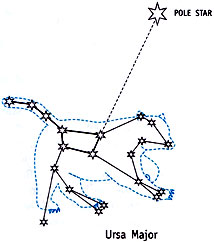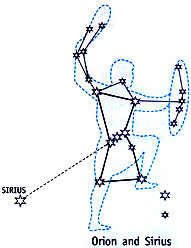Question: What is the difference between meteors and meteorites?
Answer: Meteors are small objects made up mainly of stones present in space. They regularly enter the earth’s atmosphere. As a meteor enters the earth’s atmosphere at high speed, it is heated by friction with air, and in most cases it burns to ashes in a very short time. If a meteor is large, it may fall on the earth’s surface before being completely burnt out. Such meteors are called meteorites.
Question: Both galaxies and constellations are groups of stars. Give two differences between them.
Answer:
Question: How can you locate the Pole Star with the help of Ursa Major?
Answer: We can locate the Pole Star (Dhruv Tara) with the help of Ursa Major by drawing an imaginary line through the two pointers of Ursa Major. This star is visible towards the north and is the only star that remains stationary in the sky with respect to the earth.
Question: Explain why the Pole Star appears to be stationary in the sky and all other stars appear to revolve around it from east to west.
Answer: All the other stars appear to revolve from east to west whereas pole star appears to be stationary as it lies above the North pole on the axis of rotation of the earth.
Question: Show the position of main stars in these constellations: a. Ursa Major b. Orion
Answer:
Question: Why is Venus the hottest planet even though Mercury is closest to the Sun?
Answer: Venus is a very hot planet (about 480 °C), even hotter than Mercury, though it is further away from the sun. This is because of the high percentage of carbon dioxide in its atmosphere, which causes heating due to the greenhouse effect.
 Class Notes NCERT Solutions for CBSE Students
Class Notes NCERT Solutions for CBSE Students





